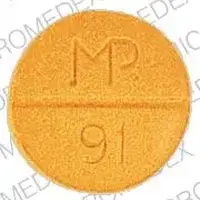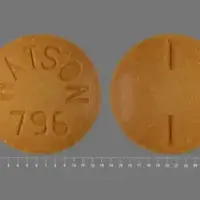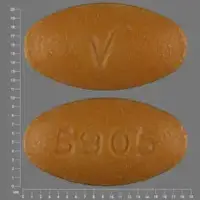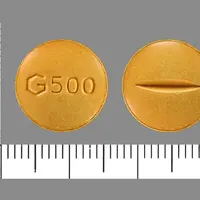Generic name: sulfasalazine
Drug class: 5-aminosalicylates, Antirheumatics
Dosage form: oral tablet, oral delayed-release tablet
Availability: Prescription only
Pregnancy & Lactation: Risk data available
Brand names: Azulfidine, Azulfidine en-tabs, Sulfazine
What is Sulfasalazine?
Sulfasalazine is a disease-modifying anti-rheumatic drug (DMARD) used to treat and manage autoimmune diseases including rheumatoid arthritis and an inflammatory bowel disease called ulcerative colitis. It is a slow-acting DMARD, taking time to build up and start working.
Sulfasalazine helps to reduce pain and swelling and lowers inflammation in your body. It limits the damage that rheumatoid arthritis causes to your joints, helping to prevent disease progression.
Sulfasalazine consists of the anti-inflammatory agent 5-aminosalicylic acid (5-ASA, mesalamine or mesalazine) and the antibiotic sulfapyridine, which are linked by a bond.
It's not fully understood how sulfasalazine works. Sulfasalazine is too big to be absorbed by your small intestine, but bacteria in your colon can break the bond between 5-ASA and sulfapyridine, which frees 5-ASA to work locally in your colon to help in ulcerative colitis. Sulfasalazine and its metabolites - the other drugs that it is broken down into - are also thought to have a range of immunomodulatory effects. They block or inhibit certain processes in your body, which helps to reduce the activity of your immune system.
Sulfasalazine has been used since the 1950s. The US Food and Drug Administration (FDA) has approved a standard tablet (Azulfidine) and an enteric-coated, delayed-release tablet (Azulfidine EN-tabs) of sulfazalazine. Generic versions of these tablets are also available.
The delay-release, enteric-coated tablets are recommended for people who experience gastrointestinal side effects such as nausea and vomiting.
What is sulfasalazine used for?
Sulfasalazine is a prescription medication that is available as a standard tablet and as a delay-release, enteric-coated tablet.
Standard sulfasalazine tablets are used:
- to treat mild to moderate ulcerative colitis.
- as an add-on (adjunctive) therapy in severe ulcerative colitis.
- to prolong periods of remission between acute attacks of ulcerative colitis.
Delay-release, enteric coated sulfasalazine tablets are used:
- to treat mild to moderate ulcerative colitis, particularly in patients who cannot take standard, uncoated sulfasalazine tablets because of gastrointestinal side effects that is not caused by high blood levels of sulfapyridine and it's metabolites. This includes patients who experience nausea and vomiting with the first few doses and patients who continue to have symptoms when their dose is reduced.
- as an add-on (adjunctive) therapy in severe ulcerative colitis.
- to prolong periods of remission between acute attacks of ulcerative colitis.
- to treat rheumatoid arthritis in patients who have responded inadequately to salicylates or other nonsteroidal anti-inflammatory drugs (NDAIDs).
- to treat pediatric patients with polyarticular-course juvenile rheumatoid arthritis who have responded inadequately to salicylates or other NDAIDs.
Rest and and physiotherapy should also be continued in patients with rheumatoid arthritis or juvenile rheumatoid arthritis if recommended. Because sulfasalazine does not produce an immediate response, other analgesic and/or NSAIDs may still be needed until sulfasalazine starts working.
Sulfasalazine is also used 'off-label' - for conditions it is not approved for - for ankylosing spondylitis, Crohn's disease and psoriatic arthritis.
It is not known if sulfasalazine is safe and effective in children below the age of 2 years old.
Related/similar drugs
Lialda, Asacol, Pentasa, Apriso, Azulfidine, Canasa, Asacol HDWarnings
Sulfasalazine can cause serious side effects including:
- Hepatic, renal, and hematologic toxicity or other conditions
Treatment with sulfasalazine has been reported to cause hypersensitivity reactions, agranulocytosis, aplastic anemia, other blood dyscrasias, renal and liver damage, irreversible neuromuscular and central nervous system changes, and fibrosing alveolitis, and these side effects have been linked to the death of some patients.
Tell your doctor if you get a sore throat, fever, pallor, purpura, or jaundice while taking sulfasalazine. These symptoms may be signs of a serious blood disorder or hepatotoxicity (liver toxicity).
Complete blood counts and urinalysis should be done frequently while on sulfasalazine. Treatment should be stopped while waiting for blood test results. - Oligospermia and Infertility
Treatment with sulfasalazine may cause oligospermia (low sperm count) and infertility in men. Stopping sulfasalazine appears to reverse these effects. - Serious Infections
Treatment with sulfasalazine may cause serious infections, including fatal sepsis and pneumonia. Tell your doctor straight away if you develop signs of an infection. Sulfasalazine treatment should be stopped if you develop a serious infection. Tests for infection and myelosuppression should be done if an infection is suspected. - Hypersensitivity Reactions
Treatment with sulfasalazine may cause severe hypersensitivity reactions which may include internal organ involvement, such as hepatitis, nephritis, myocarditis, mononucleosis-like syndrome, hematological abnormalities, and/or pneumonitis including eosinophilic infiltration. - Severe Cutaneous Adverse Reactions
- Drug Reactions with Eosinophilia and Systemic Symptoms (DRESS)
Treatment with sulfasalazine can cause severe, life-threatening, systemic hypersensitivity reactions such as drug reaction with eosinophilia and systemic symptoms (DRESS). Early signs of such a reaction include fever or swollen lymph nodes (lymphadenopathy) and these may be seen even if a rash hasn't developed yet. Tell your doctor straight away if you develop signs of systemic hypersensitivity. Treatment with sulfasalazine should be stopped if another reason for your symptoms can't be identified. - Other Severe Cutaneous Adverse Reactions
Treatment with sulfasalazine can cause other severe cutaneous adverse reactions, including exfoliative dermatitis, Stevens-Johnson syndrome (SJS) and toxic epidermal necrolysis (TEN), and acute generalized exanthematous pustulosis (AGEP). Severe cutaneous adverse reactions can be serious and are sometimes fatal. You are at highest risk for these events early in therapy, with most events occurring within the first month of treatment. Tell your doctor straight away if you develop symptoms of a severe cutaneous adverse reaction. Treatment with sulfasalazine should be stopped at the first sign of such reactions.
- Drug Reactions with Eosinophilia and Systemic Symptoms (DRESS)
How should I take Sulfasalazine
- Take sulfasalazine exactly as your doctor tells you to.
- Take tablets in evenly divided doses, preferably after meals.
- Take tablets with a full glass of water.
- Swallow delayed-release, enteric-coated tablets whole. Do not break, crush or chew.
- Your doctor will order frequent tests while you are on sulfasalazine.
Dosing information
The dose of sulfasalazine should be adjusted for each patient depending on their response and tolerance to the drug
Ulcerative Colitis
- Initial Therapy
The recommended dose for adults is sulfasalazine 3 to 4 g daily in evenly divided doses with dosage intervals not exceeding eight hours. A lower dose of 1 to 2 g may also be used to reduce the risk of gastrointestinal side effects.
The recommended dose for children ≥ 6 years of age is 40 to 60 mg/kg of body weight in each 24-hour period, divided into 3 to 6 doses. - Maintenance Therapy
The recommended dose for adults is sulfasalazine 2 g daily.
The recommended dose for children ≥ 6 years of age is 30 mg/kg of body weight in each 24-hour period, divided into 4 doses.
Rheumatoid arthritis
- The recommended dose for adults is 2 g daily in two evenly divided doses. Initially, a lower dose of 0.5 to 1 g daily should be used to reduce the risk of gastrointestinal side effects. A suggested dosing schedule is given below.
Suggested Dosing Schedule for Adult Rheumatoid Arthritis:
Week of treatment Morning No. of 500 mg tablets Evening No. of 500 mg tablets 1 - 1 2 1 1 3 1 2 4 2 2
Juvenile Rheumatoid Arthritis - polyarticular course
- The recommended dose for children ≥ 6 years of age is 30 to 50 mg/kg of body weight daily in two evenly divided doses. Typically, the maximum dose is 2 g per day. Initially a dose of a quarter to a third of the planned maintenance dose should be used and increase weekly until reaching the maintenance dose at one month. This reduces the risk of gastrointestinal side effects.
See full prescribing information for further information about sulfasalazine dosing.
Before Taking
Do not take sulfaslazine if:
- you are allergic to sulfaslazine, its metabolites, sulfonamides or salicylates or any of the other ingredients in sulfaslazine. See below for a complete list of ingredients.
- you have intestinal or urinary obstruction
- you have porphyria
What should I tell my doctor before taking sulfasalazine?
Before taking sulfasalazine you should tell your healthcare provider about all your medical conditions, including if you:
- have a history of recurring or chronic infections
- have underlying conditions or take other drugs which may make you more susceptible to infections
- have severe allergy or bronchial asthma
- have glucose-6-phosphate dehydrogenase deficiency
What happens if I miss a dose?
If you miss a dose of sulfasalazine take your next dose as soon as you remember. If it is nearly time for your next dose, just take the next dose at the right time. Do not take double the dose.
What happens if I overdose?
If you take too much sulfasalazine seek emergency medical attention or call the Poison Help line at 1-800-222-1222.
What should I know about storage and disposal of this medication?
Keep this medication in the container it came in, tightly closed, and out of reach of children. Store it at room temperature and away from excess heat and moisture (not in the bathroom).
Unneeded medications should be disposed of in special ways to ensure that pets, children, and other people cannot consume them. However, you should not flush this medication down the toilet. Instead, the best way to dispose of your medication is through a medicine take-back program. Talk to your pharmacist or contact your local garbage/recycling department to learn about take-back programs in your community. See the FDA's Safe Disposal of Medicines website (http://goo.gl/c4Rm4p) for more information if you do not have access to a take-back program.
It is important to keep all medication out of sight and reach of children as many containers (such as weekly pill minders and those for eye drops, creams, patches, and inhalers) are not child-resistant and young children can open them easily. To protect young children from poisoning, always lock safety caps and immediately place the medication in a safe location – one that is up and away and out of their sight and reach. http://www.upandaway.org
Sulfasalazine side effects
See "Important information" above.
The most common side effects of sulfasalazine are:
- anorexia
- headache
- nausea
- vomiting
- gastric distress
- reversible oligospermia.
Less frequent side effects are:
- skin rash
- pruritus
- urticaria
- fever
- Heinz body anemia
- hemolytic anemia
- cyanosis
Sulfasalazine may also produce an orange-yellow discoloration of the urine or skin.
These are not all the possible side effects of sulfasalazine. For more information, ask your doctor or pharmacist.
Call your doctor for medical advice about side effects. You may report side effects to FDA at 1-800-FDA-1088.
See more: Sulfasalazine Side EffectsWhat other drugs will affect Sulfasalazine?
Tell your doctor about all the medicines you take, including prescription and over-the-counter medicines, vitamins, and herbal supplements.
Especially tell your doctor if you take medicines that contain digoxin or folic acid. Sulfasalazine may reduce your absorption of these drugs. Sulfasalazine used in combination with methotrexate may increase your risk of gastrointestinal adverse events, especially nausea.
Know the medicines you take. Keep a list of them to show your doctor and pharmacist when you get a new medicine.
What other information should I know?
Keep all appointments with your doctor and the laboratory. Your doctor may order certain lab tests to check your response to sulfasalazine.
Do not let anyone else take your medicine. Ask your pharmacist any questions you have about refilling your prescription.
It is important for you to keep a written list of all of the prescription and nonprescription (over-the-counter) medicines you are taking, as well as any products such as vitamins, minerals, or other dietary supplements. You should bring this list with you each time you visit a doctor or if you are admitted to a hospital. It is also important information to carry with you in case of emergencies.







